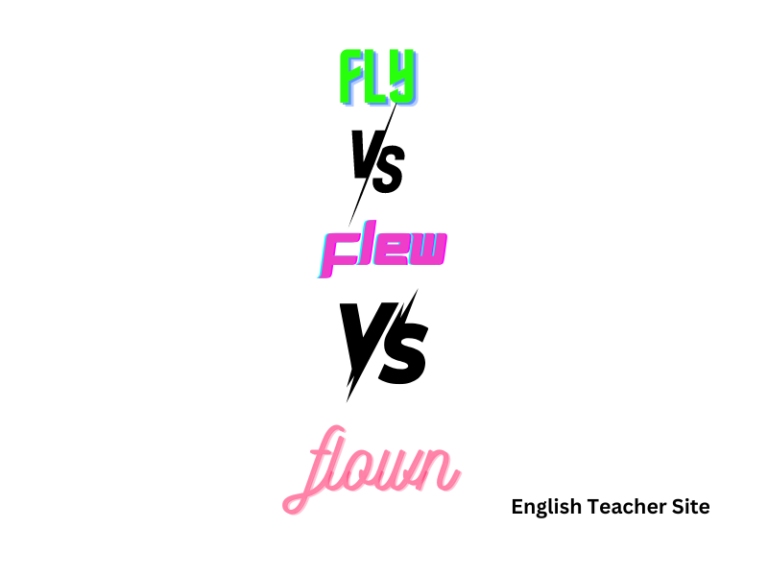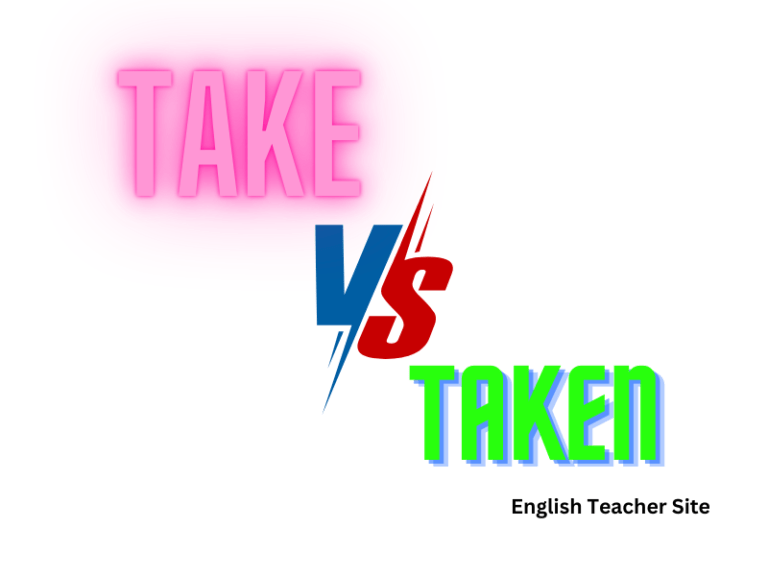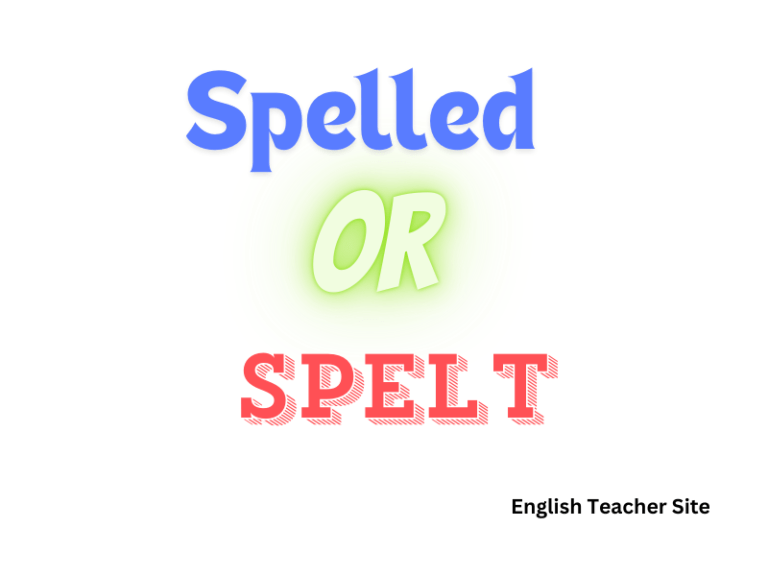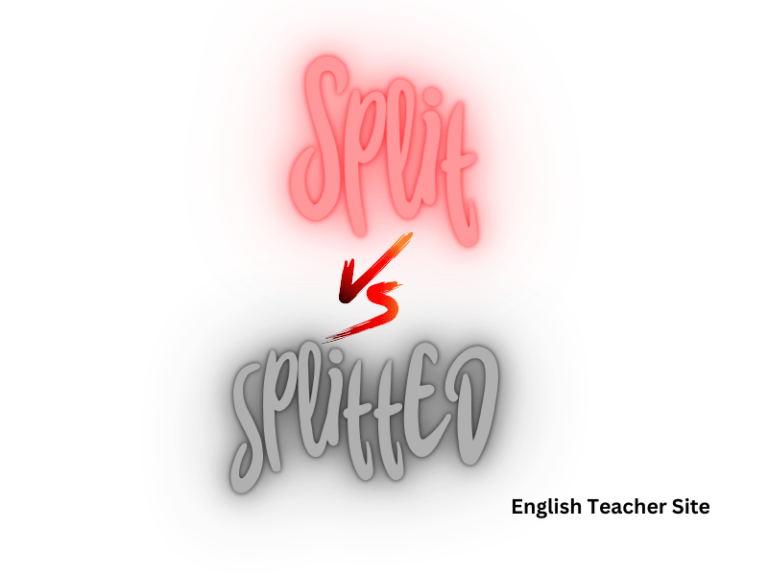What’s the Past Tense of Spoil: Spoiled vs. Spoilt Unveiled
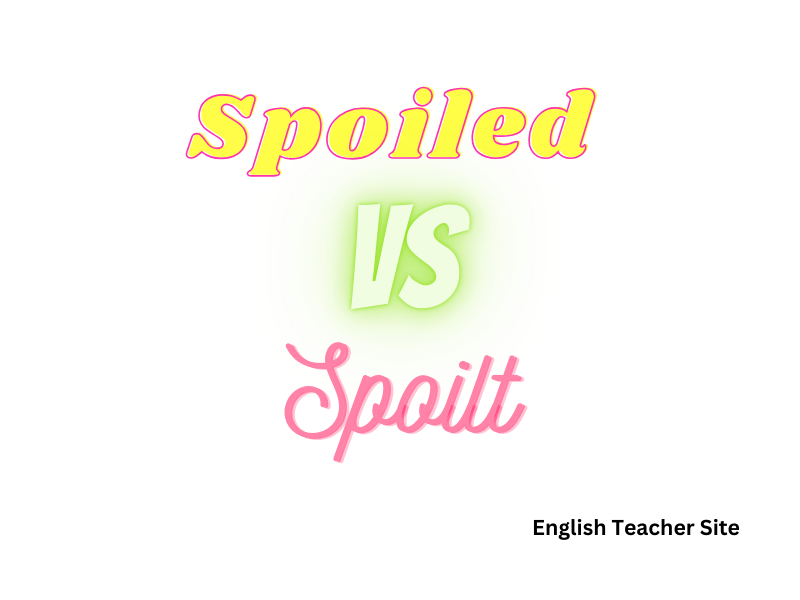
- ‘Spoiled‘ is commonly used in American English as both the simple past and past participle form.
- ‘Spoilt‘ is more typical in British English, especially as the past participle.
- The choice between ‘spoiled’ and ‘spoilt’ does not change the meaning and depends on regional preference.
The use of ‘spoiled’ versus ‘spoilt’ boils down to regional preferences, with ‘spoiled’ being the more universally accepted form in written and spoken American English. ‘Spoilt’ still finds a comfortable niche within British English, though it may occasionally be deemed archaic or stylistic in some contexts. Regardless, both ‘spoiled’ and ‘spoilt’ communicate the degradation or ruination of something, whether it be food becoming inedible or an event being marred. It’s also important to remember that these variations do not alter the meaning of the word itself.
What’s the Past Tense of Spoil? Spoiled or Spoilt?
When determining the correct past tense of the verb “to spoil,” one encounters both “spoiled” and “spoilt.” These variations reflect differences primarily influenced by geographical dialects in English usage.
Usage by Region:
| American English | British English |
|---|---|
| spoiled | spoiled/spoilt |
Examples in Sentences:
- American: He spoiled the surprise.
- British: He had spoilt the surprise.
The verb “to spoil” means to diminish or destroy the value or quality of something. In grammatical terms, “spoiled” is commonly accepted as both the simple past tense and the past participle in American English. Similarly, British English recognises “spoiled” in the same functions but also accepts “spoilt” particularly as an adjective and past participle.
Verb Forms:
- To spoil (base form)
- Spoiled/spoilt (past simple)
- Spoiled/spoilt (past participle)
Usage trends suggest that “spoiled” is increasingly preferred in contemporary writing, regardless of the dialect. However, “spoilt” continues to appear regularly in British works, maintaining its place in the language.
Notable Considerations:
- “Spoiled” adheres to the regular conjugation pattern of adding -ed to create the past tense.
- As an irregular form, “spoilt” offers an alternative that has historical precedence in the English language.
The Short Answer: Past Tense of Spoil
Conventional Use:
- Spoiled: Predominantly used in American English.
- Spoilt: More common in British English, but becoming less frequent.
Form Usage:
- Simple Past Tense: He spoiled the surprise.
- Past Participle: The milk has spoilt.
Adjectival Context:
- Spoiled: The spoiled fruit was inedible.
- Spoilt: (UK) The spoilt ballot was discarded.
To further clarify, consider the following tables:
Simple Past Tense:
| Subject | Verb |
|---|---|
| He/She/It | spoiled |
| I/You/We/They | spoiled |
Past Participle:
| Subject | Verb |
|---|---|
| He/She/It | spoiled/spoilt |
| I/You/We/They | spoiled/spoilt |
Forms of Spoil
The verb “spoil” has two recognized past forms— “spoiled” and “spoilt”—which are used differently depending on the dialect of English.
Present Tense:
- Spoil
Past Tense:
- Spoiled (American English)
- Spoilt (British English)
Past Participle:
- Spoiled (American English)
- Spoilt (British English)
These forms are derived from the Old English ‘spoilian,’ which means ‘to strip’ or ‘to rob.’ Over time, the connotations expanded to include ‘ruining’ or ‘damaging.’ Below are the conjugations for “spoil” in a tabular format to illustrate usage:
| Tense | Example |
|---|---|
| Present Tense | I often spoil my dinner by eating snacks. |
| Past Tense | Yesterday, she spoiled her appetite. |
| Past Tense | Yesterday, she spoilt her appetite. |
| Past Participle | She has spoiled the surprise. |
| Past Participle | She has spoilt the surprise. |
In American English, “spoiled” is the preferred form for both the past tense and past participle. In contrast, British English speakers may use “spoilt” in these cases. Notwithstanding regional preferences, both forms are grammatically correct and can be found in various English texts.
- Present Continuous: I am spoiling
- Present Perfect Continuous: He has been spoiling
- Past Continuous: They were spoiling
In these constructions, “spoil” is combined with auxiliary verbs to denote actions in progress or completed over a period up until now.
Quick Tip on Past Tenses
Formal vs. Informal Contexts:
- Formal writing tends toward “spoiled.”
- Informal contexts may use either interchangeably.
Comparative Usage:
“Spoiled” is typically seen as the past tense verb, while “spoilt” can be either past tense or a past participle adjective.
Below are two tables for clarification:
| Base Form | Past Tense | Past Participle |
|---|---|---|
| spoil | spoiled/spoilt | spoiled/spoilt |
| American English | Other Varieties of English |
|---|---|
| spoiled | spoiled/spoilt |
Examples of ‘Spoil’ Used in Sentences
The verb “spoil” has two widely accepted past forms: “spoiled” and “spoilt.” Their usage can vary based on regional preferences,
The following examples will help clarify their use in context.
Table 1: Examples with ‘spoiled’
| Sentence | Use Case |
|---|---|
| She spoiled her dinner by eating a large snack beforehand. | Past simple, action in the past |
| The milk has spoiled because it was left out of the fridge. | Present perfect, current result of a past action |
Table 2: Examples with ‘spoilt’
| Sentence | Use Case |
|---|---|
| The surprise party was spoilt when the guest of honor arrived early. | Past simple, action in the past |
| I feel like our vacation was spoilt by the bad weather. | Past simple, personal sentiment on a past event |
- In present tense: It is important they do not spoil their appetites.
- As a present participle: We found them spoiling for a fight.
- Using past participle in passive voice: The game was spoiled by the rain.
- In past tense with an object: They spoiled their child with too many gifts.
Examples of ‘Spoilt’ Used in Sentences
‘Spoilt’ can serve as both the past tense and the past participle form of ‘spoil’. Its usage varies between British and American English, with British English showing a larger preference for ‘spoilt’ over ‘spoiled’. Here are examples that illustrate how ‘spoilt’ is used in sentences:
Past Tense Usage
| Sentence | Explanation |
|---|---|
| She spoilt the surprise by arriving early. | ‘Spoilt’ is used as the simple past tense, indicating an action that was completed in the past. |
| The weather spoilt our picnic plans. | Here again, ‘spoilt’ suggests that the action of spoiling has taken place in the past. |
Past Participle Usage
With ‘have’:
- They have spoilt their chances of winning the championship.
With ‘be’:
- By the time we returned, the milk had turned sour and was thoroughly spoilt.
In both of these examples, ‘spoilt’ acts as the past participle used in perfect tense constructions.
As an Adjective
- The spoilt child refused to share her toys.
- The spoilt meat emitted a foul odor.
In each instance, ‘spoilt’ functions as an adjective to describe a noun that has been affected negatively.
Note on Regional Variation:
- In non-American varieties of English, you might encounter ‘spoilt’ more frequently in written and spoken form.
- Within American English, ‘spoiled’ is the form that dominates, particularly in the past participle usage.
Examples of ‘Spoiled’ Used in Sentences
- In Past Tense:
Subject Sentence She She spoiled the surprise party by arriving early. The weather The weather spoiled our picnic plans yesterday. The fruit That fruit spoiled quickly in the summer heat. - As a Past Participle:
Subject Sentence The milk The milk was spoiled after being left out of the refrigerator. The child Often, the child is described as spoiled due to excessive indulgence. The pageant The pageant was completely spoiled by the unanticipated rainstorm.
In everyday use, when referring to things going bad or decaying, such as food or events affected negatively by external factors, “spoiled” is commonly chosen. For example:
Daily Life:
- The leftover chicken spoiled because it was not refrigerated.
- Too much fertilizer spoiled the crop’s growth.
When distinguishing between “spoiled” and “spoilt,” the former is predominantly preferred for past tense in American English. Here are two examples:
American English:
- The movie was spoiled for me by all the reviews I read.
- Spoiled fruits should not be consumed.
When the word functions as an adjective, particularly in describing overindulgent behavior, “spoiled” also appears:
As an Adjective:
- The spoiled dog refused to eat generic brand food.
- She dealt with her spoiled brother’s tantrums daily.
While “spoiled” is more universally accepted, “spoilt” can occasionally be found, particularly in British English, in the adjectival form. However, for the purpose of these examples, the focus remains on the word “spoiled.”
Synonyms of Spoil
In the context of past tense forms, “spoil” has two variants, “spoiled” and “spoilt”. However, we’re focusing on synonyms that share the meaning with “spoil”, which contribute to a richer English vocabulary.
Spoil, in its basic form, signifies a reduction in value or quality, often due to neglect or damage. Its application ranges from food that has become inedible to a ruined experience.
| Action-based Synonyms | Contextual Examples |
|---|---|
| Mar | The scratched surface marred the table. |
| Ruin | The rain ruined the outdoor wedding. |
| Wreck | Mismanagement wrecked the project. |
Apart from actions, “spoil” can describe conditions, particularly with perishable items:
| Condition-based Synonyms | Contextual Examples |
|---|---|
| Rot | Without refrigeration, the meat will rot. |
| Decompose | Fallen leaves naturally decompose over time. |
| Putrefy | Left unchecked, food waste can putrefy. |
Remember, nuances exist; ruin might be too strong when describing minor damage, whereas mar typically implies superficial impairment. Meanwhile, rot, decompose, and putrefy are often used in reference to organic matter breaking down.
- When dealing with spoiled food, rotten and putrid help convey the severity of decay.
- A situation soured by small errors could be said to have been blemished rather than outright ruined.
- Tarnish often describes how metal or reputation has lost its luster, mirroring spoilage through degradation.
To sap something is to gradually weaken or spoil its strength or value, much like long-term exposure to the elements might degrade an object. In literature, a character’s potential could be stunted by adverse circumstances, reflecting a metaphorical form of spoiling.
By acquainting oneself with these synonyms of “spoil,” language can be employed with precision, painting accurate strokes for every narrative.
Origin of the Word ‘Spoil’
The term spoil stems from a rich historical tapestry, reaching back to the ancient languages of Latin and Old French. Initially, the Latin verb “spoliare,” meaning to strip, rob, or plunder, laid the foundation for the term.
| Latin Origin | Old French Influence |
|---|---|
| spoliare (verb) | espoille (noun) |
| to rob, plunder | goods seized in war |
In its journey to becoming an English word, “spoil” also drew influence from the Old French noun “espoille,” which referred to booty or goods captured during times of war. This term correlated directly with the action it described, evoking images of a conqueror taking valuables from the defeated.
- c. 1300: The noun “spoil” enters English, signifying goods taken during conflict.
- 14th Century: “Spoil” evolves to include the act of ruining or damaging.
The evolution of “spoil” continued in England, developing into the familiar verb form that signifies causing harm or damage to something, whether through literal plunder or more figurative means like food spoilage.
| Century | English Development |
|---|---|
| 14th Century | spoil (verb) |
| Modern English | spoiled/spoilt (past) |
By the 14th century, the verb usage had entrenched itself within the English language. As English evolved, so did the forms of “spoil,” leading to the past tense variations spoiled and spoilt, the latter of which has become less commonly used, especially in American English. The distinction in their usage often reflects geographical and stylistic preferences, while both are recognized as grammatically correct.
Sources
My name is Khamis Maiouf. I am the creator of the English Teacher Site, dedicated to providing valuable resources and insights for students around the world. With a passion for education and a commitment to helping students enhance their skills, I aim to make English teaching more effective and enjoyable for both educators and students.

